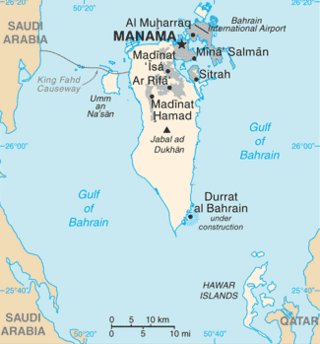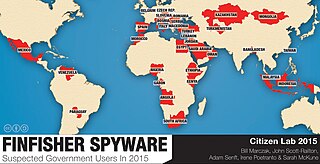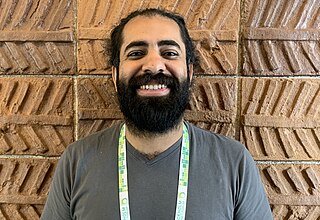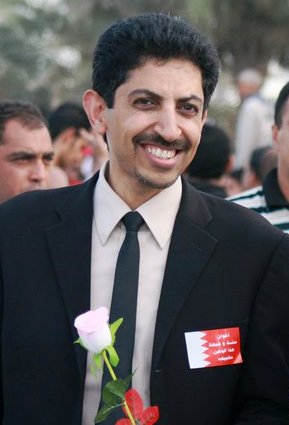Related Research Articles

The 1990s uprising in Bahrain also known as the uprising of dignity was an uprising in Bahrain between 1994 and 1999 in which leftists, liberals and Islamists joined forces to demand democratic reforms. The uprising caused approximately forty deaths and ended after Hamad bin Isa Al Khalifa became the Emir of Bahrain in 1999 and a referendum on 14–15 February 2001 massively supported the National Action Charter. The uprising resulted in the deaths of around 40 civilians and at least one Bahraini soldier.

Bahrain's record on human rights has been described by Human Rights Watch as "dismal", and having "deteriorated sharply in the latter half of 2010". Their subsequent report in 2020 noted that the human rights situation in the country had not improved.

The 2011Bahraini uprising was a series of anti-government protests in Bahrain led by the Shia-dominant and some Sunni minority Bahraini opposition from 2011 until 2014. The protests were inspired by the unrest of the 2011 Arab Spring and protests in Tunisia and Egypt and escalated to daily clashes after the Bahraini government repressed the revolt with the support of the Gulf Cooperation Council and Peninsula Shield Force. The Bahraini protests were a series of demonstrations, amounting to a sustained campaign of non-violent civil disobedience and some violent resistance in the Persian Gulf country of Bahrain. As part of the revolutionary wave of protests in the Middle East and North Africa following the self-immolation of Mohamed Bouazizi in Tunisia, the Bahraini protests were initially aimed at achieving greater political freedom and equality for the 70% Shia population.
Saeed al-Shehabi is a London-based Bahraini political activist, journalist, commentator and member of the Bahrain Freedom Movement.

Nabeel Ahmed Abdulrasool Rajab is a Bahraini human rights activist and opposition leader. He is a member of the Advisory Committee of Human Rights Watch's Middle East Division, Deputy Secretary General for the International Federation for Human Rights (FIDH), former chairman of CARAM Asia, member of the Advisory Board of the Bahrain Rehabilitation and Anti-Violence Organization (BRAVO), and Founding Director of the Gulf Centre for Human Rights (GCHR).

Ali Jawad al-Sheikh was a 14-year-old Bahraini who died in the hospital on 31 August 2011 after reportedly being hit in the head by a tear gas canister shot by Bahraini security forces during the Bahraini uprising. The Bahraini government denied security force involvement in his death and offered a reward for information on the incident. Activists, however, began a series of large protests after his funeral.
Ahmed Jaber Ali al-Qattan was a 16 or 17-year-old Bahraini who died in a hospital on 6 October 2011 after reportedly being hit in the chest, abdomen and upper limb by bird pellet gunshots fired by Bahraini security forces during the Bahraini uprising (2011–present). Several human rights organizations in Bahrain believe that the use of birdshot against humans is banned under international law, while the Ministry of Interior disagrees. The Ministry of Interior stated that there was a gathering of 20 people in Abu Saiba who blocked the roads and police men intervened to disperse them as authorized. Activists, however, began a series of large protests after his funeral.
Coalition Youth of 14 Feb Revolution, sometimes called The Coalition is a Bahraini youth group, named after the date of the beginning of Bahrain's uprising, and led by anonymous individuals who organize protests chiefly via new-media sites. The Coalition first appeared on the popular pro-democracy forum Bahrain Online. Their Facebook page started in April 2011 where they have 65,282 likes. It is the main Facebook page that calls for daily peaceful demonstrations and protests. One of the first sub-groups called February 14 Youth was behind the call for demonstrations on February 14, 2011, named "Day of Rage" and developed later to a nationwide uprising. in 2017, the group has been designated as a terrorist organization by Bahrain, Saudi Arabia, United Arab Emirates and Egypt.

FinFisher, also known as FinSpy, is surveillance software marketed by Lench IT Solutions plc, which markets the spyware through law enforcement channels.

As of 15 March 2013, the Bahraini uprising of 2011 and its aftermath resulted in 122 deaths. The number of injuries is hard to determine due to government clamp-down on hospitals and medical personnel. The last accurate estimate for injuries is back to 16 March 2011 and sits at about 2708. The Bahrain Independent Commission of Inquiry concluded that many detainees were subjected to torture and other forms of physical and psychological abuse while in custody, five of whom returned dead bodies. The BICI report finds the government responsible for 20 deaths. Opposition activists say that the current number is 88 including 43 who allegedly died as a result of excessive use of tear gas.

Mohammed Abdulnabi al-Maskati is a Bahraini human rights activist and digital security consultant for Middle East and North Africa. He is the founder of the Bahrain Youth Society for Human Rights (BYSHR), a leading group in the 2011-2012 Bahraini uprising.
The following is a timeline of events that followed the Bahraini uprising of 2011 from April to June 2011. This phase included continued crackdown, lifting of the state of emergency and return of large protests.

The following is a timeline of the Bahraini uprising from February to March 2011, beginning with the start of protests in February 2011 and including the Saudi and Emirati-backed crackdown from 15 March.

The Day of Rage is the name given by protesters in Bahrain to 14 February 2011, the first day of the national uprising as part of the Arab Spring. Inspired by successful uprisings in Egypt and in Tunisia, Bahraini youth organised protests using social-media websites. They appealed to the Bahraini people "to take to the streets on Monday 14 February in a peaceful and orderly manner". The day had a symbolic value, being the ninth and tenth anniversaries of the country's 2002 constitution and the National Action Charter respectively.

The Bahrain Thirteen are thirteen Bahraini opposition leaders, rights activists, bloggers and Shia clerics arrested between 17 March and 9 April 2011 in connection with their role in the national uprising. In June 2011, they were tried by a special military court, the National Safety Court, and convicted of "setting up terror groups to topple the royal regime and change the constitution"; they received sentences ranging from two years to life in prison. A military appeal court upheld the sentences in September. The trial was "one of the most prominent" before the National Safety Court. A retrial in a civilian court was held in April 2012 but the accused were not released from prison. The sentences were upheld again on 4 September 2012. On 7 January 2013, the defendants lost their last chance of appeal when the Court of Cassation, Bahrain's top court upheld the sentences.
The following is an incomplete timeline of events that followed the Bahraini uprising of 2011 from September 2012 onward.
Bahrain Tamarod, also known as August 14 Rebellion, was a three-day protest campaign in Bahrain that began on 14 August 2013, the forty-second anniversary of Bahrain Independence Day and the two-and-a-half-year anniversary of the Bahraini uprising. The call for protests had started in early July following and inspired by the Egyptian Tamarod Movement that led to the removal of President Mohamed Morsi. Calling for a "free and democratic Bahrain", Tamarod activists, who mobilized social networking websites, said their movement was peaceful, national and non-sectarian. They called for gradual peaceful civil disobedience starting from 14 August. The movement gained the support of opposition societies and human rights activists, including those languishing in prison. The government however, repeatedly warned against the protests, promising those who participate with legal action and forceful confrontation. Rights activists and media reported that authorities had stepped up their crackdown campaigns in the weeks leading to the protests.

Combined Systems, Inc. is a U.S.-based company, specializing in the manufacture of military and police equipment such as tear gas canisters, flash grenades, breaching munitions, and handcuffs. It supplies these products to police and military in the United States as well as Egypt and Israel. Evidence has also been collected by the War Resisters League that its products have been used to disperse protests in Tunisia, Chile, Bolivia, Guatemala, Germany, Netherlands, India, East Timor, Hong Kong, Argentina, Thailand, Trinidad and Tobago, Cameroon, Colombia, Sierra Leone, The United States and Egypt. Discovery of the use of tear gas produced by the US company in various police actions against demonstrations around the world was met with controversy in the social media discussions related to events of the Arab Spring. In February 2012, the online activist group Anonymous claimed to have hacked the company's website in retaliation for the company's supply of protest suppression weapons to various countries.
Pegasus is spyware developed by the Israeli cyber-arms company NSO Group that is designed to be covertly and remotely installed on mobile phones running iOS and Android. While NSO Group markets Pegasus as a product for fighting crime and terrorism, governments around the world have routinely used the spyware to surveil journalists, lawyers, political dissidents, and human rights activists.
Ala'a Shehabi, sometimes referred to as Ala'a al-Shehabi, is a British-born Bahraini journalist and democracy-rights activist.
References
- 1 2 3 "The Bahraini activist Ala'a Shehabi: David versus goliath". Qantara.de. May 30, 2014. Retrieved 2023-09-10.
- ↑ Gladstone, Rick (2012-08-01). "Bahrain Is Criticized for Its 'Torrent' of Tear Gas Use". The New York Times. ISSN 0362-4331 . Retrieved 2023-09-10.
- 1 2 "South Korea halts Bahrain tear gas exports". BBC News. 2014-01-08. Retrieved 2023-09-10.
- ↑ Fahim, Kareem (2013-10-22). "Rights Group Warns Against Bahrain's Use of Tear Gas Against Protesters". The New York Times. ISSN 0362-4331 . Retrieved 2023-09-10.
- ↑ "Bahrain Watch et al. vs. Dae Kwang". OECD Watch. Retrieved 2023-09-10.
- ↑ Zetter, Kim. "Bahraini Activists Hacked by Their Government Go After UK Spyware Maker". Wired. ISSN 1059-1028 . Retrieved 2023-09-10.
- ↑ "A brief history of governments hacking human rights organizations". Amnesty International. 2016-01-11. Retrieved 2023-09-10.
- ↑ "Bahrain Watch: We Identified Targeted Digital Attack on Bahraini Activists Abroad". Bahrain Mirror. Retrieved 2023-09-10.
- ↑ "How Did "Bahrain Watch" Tests Prove Bahraini Gov't Technique in Deliberate Cut of Internet in Diraz?". Bahrain Mirror. Retrieved 2023-09-10.
- ↑ Toor, Amar (2016-08-04). "Bahrain's internet shutdown marks a 'new form of information control'". The Verge. Retrieved 2023-09-10.
- ↑ "Bahrain imposes 'internet curfew' near protests, activists say". Engadget. 2019-07-19. Retrieved 2023-09-10.
- ↑ "#200MoreStories: Bahrain Watch Launches Website in Response to British Council's Competition Celebrating 200 Years of Colonialism". Bahrain Mirror. Retrieved 2023-09-10.
- ↑ Evans, Rob (2016-12-06). "British thinktank received £25m from Bahraini royals, documents reveal". The Guardian. ISSN 0261-3077 . Retrieved 2023-09-10.
- ↑ "Bahrain Watch Launches the Bahrain Budget Transparency Project". Bahrain Mirror. Retrieved 2023-09-10.
- ↑ "Bahrain: Official Threatens Online Crackdown". Human Rights Watch. 2018-03-30. Retrieved 2023-09-10.
- ↑ Bahrain Watch 'About Us' page Archived 2014-04-20 at the Wayback Machine , accessed 13 May 2014